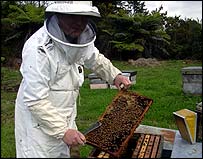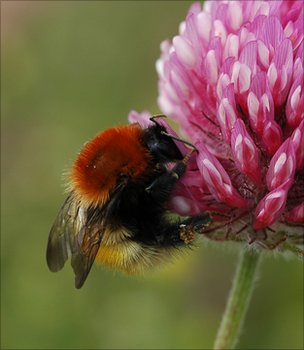02-05-2010
Fears for crops as shock figures from America show scale of bee catastrophe
The world may be on the brink of biological disaster after news that a third of US bee colonies did not survive the winter.

Disturbing evidence that honeybees are in terminal decline has emerged from the United States where, for the fourth year in a row, more than a third of colonies have failed to survive the winter.
The decline of the country's estimated 2.4 million beehives began in 2006, when a phenomenon dubbed colony collapse disorder (CCD) led to the disappearance of hundreds of thousands of colonies. Since then more than three million colonies in the US and billions of honeybees worldwide have died and scientists are no nearer to knowing what is causing the catastrophic fall in numbers.
The number of managed honeybee colonies in the US fell by 33.8% last winter, according to the annual survey by the Apiary Inspectors of America and the US government's Agricultural Research Service (ARS).
The collapse in the global honeybee population is a major threat to crops. It is estimated that a third of everything we eat depends upon honeybee pollination, which means that bees contribute some £26bn to the global economy.
Potential causes range from parasites, such as the bloodsucking varroa mite, to viral and bacterial infections, pesticides and poor nutrition stemming from intensive farming methods. The disappearance of so many colonies has also been dubbed 'Mary Celeste syndrome' due to the absence of dead bees in many of the empty hives.
US scientists have found 121 different pesticides in samples of bees, wax and pollen, lending credence to the notion that pesticides are a key problem. "We believe that some subtle interactions between nutrition, pesticide exposure and other stressors are converging to kill colonies," said Jeffery Pettis, of the ARS's bee research laboratory.
A global review of honeybee deaths by the World Organisation for Animal Health (OIE) reported last week that there was no one single cause, but pointed the finger at the "irresponsible use" of pesticides that may damage bee health and make them more susceptible to diseases. Bernard Vallat, the OIE's director-general, warned: "Bees contribute to global food security, and their extinction would represent a terrible biological disaster."
Dave Hackenberg of Hackenberg Apiaries, the Pennsylvania-based commercial beekeeper who first raised the alarm about CCD, said that last year had been the worst yet for bee losses, with 62% of his 2,600 hives dying between May 2009 and April 2010. "It's getting worse," he said. "The AIA survey doesn't give you the full picture because it is only measuring losses through the winter. In the summer the bees are exposed to lots of pesticides. Farmers mix them together and no one has any idea what the effects might be."
Pettis agreed that losses in some commercial operations are running at 50% or greater. "Continued losses of this magnitude are not economically sustainable for commercial beekeepers," he said, adding that a solution may be years away. "Look at Aids, they have billions in research dollars and a causative agent and still no cure. Research takes time and beehives are complex organisms."
In the UK it is still too early to judge how Britain's estimated 250,000 honeybee colonies have fared during the long winter. Tim Lovett, president of the British Beekeepers' Association, said: "Anecdotally, it is hugely variable. There are reports of some beekeepers losing almost a third of their hives and others losing none." Results from a survey of the association's 15,000 members are expected this month.
John Chapple, chairman of the London Beekeepers' Association, put losses among his 150 members at between a fifth and a quarter. Eight of his 36 hives across the capital did not survive. "There are still a lot of mysterious disappearances," he said. "We are no nearer to knowing what is causing them."
Bee farmers in Scotland have reported losses on the American scale for the past three years. Andrew Scarlett, a Perthshire-based bee farmer and honey packer, lost 80% of his 1,200 hives this winter. But he attributed the massive decline to a virulent bacterial infection that quickly spread because of a lack of bee inspectors, coupled with sustained poor weather that prevented honeybees
from building up sufficient pollen and nectar stores.
The government's National Bee Unit has always denied the existence of CCD in Britain, despite honeybee losses of 20% during the winter of 2008-09 and close to a third the previous year. It attributes the demise to the varroa mite – which is found in almost every UK hive – and rainy summers that stop bees foraging for food.
In a hard-hitting report last year, the National Audit Office suggested that amateur beekeepers who failed to spot diseases in bees were a threat to honeybees' survival and called for the National Bee Unit to carry out more inspections and train more beekeepers. Last summer MPs on the influential cross-party public accounts committee called on the government to fund more research into what it called the "alarming" decline of honeybees.
The Department for the Environment, Food and Rural Affairs has contributed £2.5m towards a £10m fund for research on pollinators. The public accounts committee has called for a significant proportion of this funding to be "ring-fenced" for honeybees. Decisions on which research projects to back are expected this month.
WHY BEES MATTER
Flowering plants require insects for pollination. The most effective is the honeybee, which pollinates 90 commercial crops worldwide. As well as most fruits and vegetables – including apples, oranges, strawberries, onions and carrots – they pollinate nuts, sunflowers and oil-seed rape. Coffee, soya beans, clovers – like alfafa, which is used for cattle feed – and even cotton are all dependent on honeybee pollination to increase yields.
In the UK alone, honeybee pollination is valued at £200m. Mankind has been managing and transporting bees for centuries to pollinate food and produce honey, nature's natural sweetener and antiseptic. Their extinction would mean not only a colourless, meatless diet of cereals and rice, and cottonless clothes, but a landscape without orchards, allotments and meadows of wildflowers – and the collapse of the food chain that sustains wild birds and animals.
Source: Guardian.co.uk
Related article: Bees in more trouble than ever after bad winter














